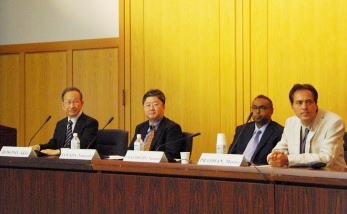What is the Impact of Community Participation in School Management? JICA-RI Holds a Seminar on Impact Evaluation Analyses of Education Projects
2014.10.06
On September 22, JICA-RI held a public seminar titled “Impact Evaluation Analyses of Education Projects in Developing Countries: Cases of Community Participation in School Management.”
As “aid effectiveness” has become an important issue, more efforts have been pursued for better monitoring and evaluation of development projects. Nowadays, “impact evaluation” is widely used to empirically assess the impact of development projects. As part of its research project titled “Impact Evaluation Analyses for the JICA Projects,” JICA-RI is rigorously analyzing the impacts of the “School for All” project in Burkina Faso. The seminar focused on impact evaluation analyses of school-based management (SBM) in education projects aiming at sharing the recent study results and challenges. SBM is an effort to improve education services by delegating authority of school management to school level. Many countries encourage community participation in SBM.
Akio Hosono JICA Senior Research Advisor moderated the seminar. Yasuyuki Sawada, Professor at the Faculty of Economics, the University of Tokyo (JICA-RI Visiting Fellow), Dr. Nazmul Chaudhury, Lead Economist at the World Bank and Menno Pradhan, Professor at the University of Amsterdam gave presentations on their work.
Firstly, Prof. Sawada presented the overview of the impact evaluation analysis of JICA’s “School for All” project, as well as the summary of the existing studies on SBM. In the “School for All” project, the school management committee consisting of elected members including parents, the school principal, and teachers lead the activities to improve the education environment using community resources. Adopting a hybrid evaluation method of randomized controlled trials (RCTs) and artefactual field experiments on the public goods, the study found that the project may have strengthened the social capital among community members, parents and school personnel. He also pointed out two future research issues: identification of the causal relationships among key factors in SBM, and testing the external validity across different countries and regions.

(From left) Hosono SRA, Professor Sawada,
Dr. Nazmul, Professor Pradhan
Secondary, Dr. Nazmul Chaudhury presented the SBM impact evaluation by the World Bank. He defined the SBM as a particular form of decentralization for improving governance in education. Using the case of Nepal, he pointed out that the involvement of parents and community members is effective since they have the best knowledge on what is going on in schools. Since 2001, Nepal has been implementing the policy of community managed schools. The World Bank assisted the policy through Nepal Community School Support Project. The impact evaluation study of the project showed that the project increased the participation of parents in school management as well as children’s enrollment opportunities, while no improvements on learning outcomes were confirmed.
Lastly, Prof. Menno Pradhan gave a presentation on the project in Indonesia. In his study, they tried two different methods (“election” and “linkage”) for strengthening school management committees on top of the grant and training assistance to school management committees. In the “election” treatment schools, school committee members were chosen through election. In the “linkage” schools, the school committee and the village council strengthen their linkage via joint planning meetings. The analysis showed that the strengthening of linkage and elections combined with linkage is most cost-effective in improving learning.
Researchers, students and practitioners of NGOs and development institutions actively participated in the discussion that followed presentations. The comments and views shared among participants are: SBM is not a panacea for all problems, thus needs to be combined with other interventions; the impacts of SBM depend on the project contents such as the teaching materials and training programs, or on the context of the country or region; and some interventions may take longer time to have observable outcomes. It was also pointed out that future research topics should tackle the causal chains and factors to influence learning outcomes, and more elaborated cost benefit analysis. JICA-RI will further continue research on impact analysis building on the outcome of the seminar.

事業事前評価表(地球規模課題対応国際科学技術協力(SATREPS)).国際協力機構 地球環境部 . 防災第一チーム. 1.案件名.国 名: フィリピン共和国.

事業事前評価表(地球規模課題対応国際科学技術協力(SATREPS)).国際協力機構 地球環境部 . 防災第一チーム. 1.案件名.国 名: フィリピン共和国.

事業事前評価表(地球規模課題対応国際科学技術協力(SATREPS)).国際協力機構 地球環境部 . 防災第一チーム. 1.案件名.国 名: フィリピン共和国.

事業事前評価表(地球規模課題対応国際科学技術協力(SATREPS)).国際協力機構 地球環境部 . 防災第一チーム. 1.案件名.国 名: フィリピン共和国.

事業事前評価表(地球規模課題対応国際科学技術協力(SATREPS)).国際協力機構 地球環境部 . 防災第一チーム. 1.案件名.国 名: フィリピン共和国.
scroll